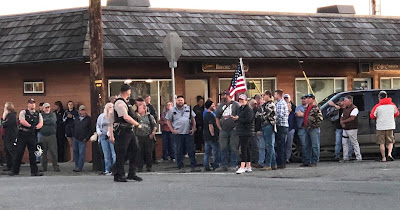by Peter Nohrnberg
Now gather round ye faithful Folk
For I have a tale to tell
About a righteous POTUS who
Like Jesus harrowed Hell!
When terrorists (Antifa trained)
Assembled in the Park
And cast a shadow on his House
Of White with all their Dark
He gathered up his Family
(They helped with his Election)
And said without a trace of fear
“It’s time for an Inspection!”
Down and down, far underground
Where mole rats make their home:
He ventured to an Underworld
deep within Earth’s loam.
Fathoms below The People’s House,
A Bunker built for crisis:
With plumbing, air con, freezers full
Of tea and cake and ices;
Clocks, computers, radios,
Guns and knives and tasers,
flashlights, nightlights, bowling balls,
and triple-bladed razors.
One musty room was full of shelves
That held strange leather things.
The President took one of them
And ruffled its mottled wings.
“Now what the hell is this thing here?”
He asked with scornful look.
Quoth the Secret Service Man,
“Sir, it’s called a Book.”
Behind a shelf then stepped an Aide
Whom none recalled descending:
His face obscured by sunglasses,
His jerkin needing mending.
“Some say strange powers Books possess,
Hold wisdom of the ages:
Tales of the past for future use
Contained within their pages.”
The President just gave a shrug
And dropped it on the floor.
He walked right out and asked to see
If there was anything more.
He passed through many well stocked rooms
All suitably provisioned
For the year-long nuclear Winter that
Dr. Strangelove had envisioned.
A Room much vaster than the rest
held medical supplies.
And when He spied a Ventilator
The scales fell from his eyes.
“This shithole bunker is the pits,
It’s ugly and it’s dim,
I wouldn’t put Kim Jung-un up here
Let alone my next of kin.
No Twitter, Big Macs, tanning beds:
How could I have a life?
The pornos in the home theater
Are older than my wife!”
And so with that the President
Ascended from the Cave.
He rose up from that deathly place
Like our Savior from the Grave!
He claimed a tax deduction on
The bunker’s cancelled lease,
Then heard ten thousand Citizens
All protesting in Peace.
“What the hell? They’re still here?
I thought they had gone home!
Bring me General William Barr
It’s time to flood the zone!”
Out of a pond in Garden Rose
Hopped forth a wondrous sight:
A Bullfrog clad in Brooks Brothers,
Croaked he, “Unite the Right!”
His toady eyes betrayed no shame
From out his tortoiseshell glasses.
He whispered into the Joint Chief’s ear
“It’s time to kick some asses!
For all those gathered fail to see
Our Savior Has Arisen!
Bring me our Proud Boys with batons
From the Texas Bureau of Prisons!”
Then from Ivanka’s ruby Lips
These honeyed words did drop:
“O Big Daddy ain’t it time
For an upbeat photo op?”
Another mayonnaise-faced Damsel
(She was yclept Hope Hicks)
Recalled a hallowed Church nearby
To help Him in His fix.
The Photographer urged getting there
before the sun had set;
So they smoked and gassed those uppity Folks
In the Park of Lafayette.
Once the acrid air had cleared
The President took his stroll:
O what a wonderous thing to see
An upright walking Troll!
He stood before the ancient Kirk
In a suit that did not fit;
Ivanka from Max Mara Purse
Pulled out the Holy Writ.
She handed Him the booky thing
He did not know its function.
He held it high above His Head
Like a bidder at an auction.
He did not read a single Verse,
Nor recite a Psalm.
The cameras clicked and no one spoke;
There was an eerie calm.
The Nation watched the scene unfold
From start to finish brief.
Those who could breathe, they held their breath
In total disbelief.
POTUS tried to find his groove,
He tweeted “Law and Order!”
Around His Keep He built a Wall
Just like at the Border.
His House of White He made a Jail,
Himself its Detainee:
Like a Castaway on a desert Isle,
Or a Strongman wannabee.
But He had been a Prisoner
Before this tale was told.
His mindforged Manacles were wrought
Of twenty-four carat Gold.
The White House dark, the Streets alive;
The Pundits have their answer.
Come November our Prisoner-in-Chief
Will be awaiting transfer…
A scholar of literary modernism specializing in James Joyce,
Peter Nohrnberg also writes poetry and satire. He has served as poetry ambassador to the City of Cambridge, MA, and his poems have appeared in
Notre Dame Review, Wisconsin Review, Oxford Poetry, and
Oberon, among other journals. He currently vents his spleen on
satirely.com .






























